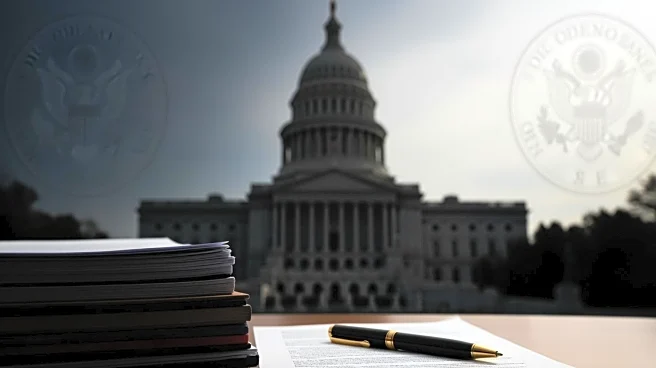What's Happening?
The U.S. government shutdown has entered its third week as Senate Republicans and Democrats remain at an impasse over funding proposals. On Wednesday, the Senate rejected a GOP-led short-term funding resolution for the ninth time, with a vote of 51-44.
Republicans are advocating for a 'clean' continuing resolution to fund the government until November 21, while Democrats are pushing for a bill that includes extended Affordable Care Act subsidies, estimated to cost $1 trillion. The Trump administration has reported that over 4,000 federal employees have been notified of layoffs, with potential job cuts exceeding 10,000. Senate Majority Leader John Thune criticized Democrats for their refusal to pass the Republican proposal, citing impacts on military families and those in need of nutrition assistance. Senate Minority Leader Chuck Schumer countered, emphasizing the urgency of addressing the health care crisis.
Why It's Important?
The ongoing government shutdown has significant implications for federal employees, military families, and individuals reliant on government services. The deadlock over funding proposals highlights the deep partisan divide in Congress, affecting public policy and economic stability. The refusal to pass a funding bill could lead to further layoffs and disruptions in essential services, impacting vulnerable populations. The debate over ACA subsidies underscores the broader health care challenges facing the nation, with potential consequences for insurance rates and coverage. The shutdown also poses risks to disaster preparedness and response, particularly during hurricane season.
What's Next?
The Senate remains in a stalemate, with Republicans seeking additional Democratic support to pass a clean continuing resolution. The Trump administration continues to pressure Senate Democrats to approve the GOP proposal, while Democrats insist on addressing health care issues. The situation may lead to intensified negotiations or further political maneuvering as both parties seek to resolve the impasse. The potential for extended layoffs and service disruptions could increase public pressure on lawmakers to reach a compromise. The outcome of these negotiations will have lasting effects on government operations and public policy.
Beyond the Headlines
The government shutdown highlights the ethical and political challenges of balancing fiscal responsibility with social welfare. The debate over ACA subsidies reflects broader tensions in U.S. health care policy, with implications for access and affordability. The shutdown also raises questions about the role of government in providing essential services and the impact of political gridlock on public trust. Long-term shifts in health care policy and government funding priorities may emerge from this crisis, influencing future legislative agendas.
















